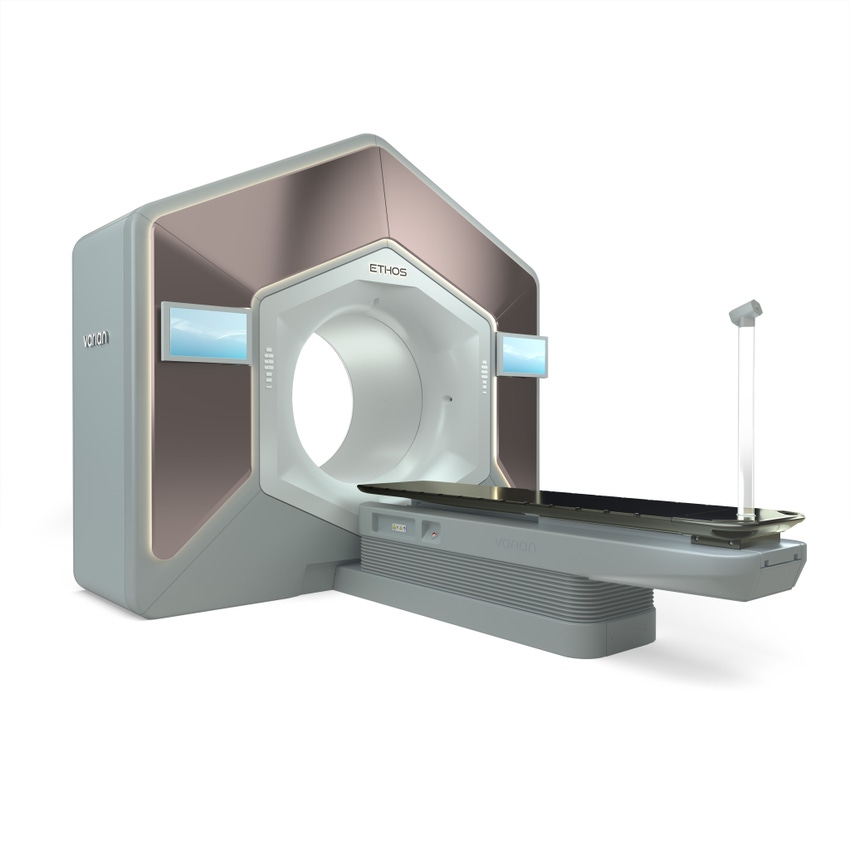Varian Uses AI to Usher in New Era of Cancer Therapy at ASTRO
Ethos Therapy is an artificial intelligence-driven holistic solution designed to increase the efficiency of radiotherapy. Palo Alto, CA-based Varian has CE mark for Ethos and FDA clearance is pending.
September 13, 2019

Four years ago, Varian’s Applied Research Team, a group separate from its research and development unit, began looking at how to incorporate artificial intelligence into cancer therapy. The team’s hard work has resulted in the development of Ethos, an AI-driven holistic solution designed to increase the efficiency of radiotherapy.
MD+DI spoke with Chris Toth, president of Varian Oncology Systems ahead of Ethos’ launch at the American Society for Radiation Oncology [ASTRO] annual meeting in Chicago held this week. Ethos is an Adaptive Intelligence solution.
Toth told MD+DI, “Ethos therapy is the culmination of decades of the pursuit of how to personalize and adapt radiation therapy to every patient; everyday; in their anatomy; in any deprivation of the tumor or associated tissue, so that we can absolutely achieve what we want to in the context of maximizing the dose to the tumor and missing the healthy tissue.”
The Palo Alto, CA-based company’s technology has CE mark and not yet been cleared in the U.S. The company said FDA clearance is pending. Ethos solves for an issue that has plagued cancer therapy treatments for years.
“The challenge remains that patients get their treatments over a certain number of visits,” Toth said. “It could be five … 10 … 40 different visits. You can have this really beautiful dose distribution but if in between treatments the patient moves, or they’re not set up perfectly the same, you’ve missed the target. [Between] 2005 and 2010, a whole series of image-guided technologies became available that allowed us to couple that with Intensity-modulated radiation therapy and ensure that we get the patients and physicians in the right spot. But the problem was – and still is – tumors in anatomy change in patients throughout the course of therapy. In addition, it takes hours to create the right treatment plan for patients. So, it just hasn’t been feasible to adapt and change that treatment plan and dose on a daily basis – simply because you’re not going to have a cancer patient laying on a table for hours.”
The streamlined workflow of Ethos therapy is enabled by its AI-driven planning and contouring capabilities and can eliminate the issues Toth points out. The physician defines their clinical intent from predefined templates and the initial treatment plan is generated based on the physician’s intent.
The treatment plan is adapted in response to the variability of the tumor’s shape and cellular characteristics, along with fluctuations in the tumor’s position due to changes in nearby organs. The ability of Ethos to deliver on-couch adaptive treatment puts the patient at the center of care and significantly reduces treatment times to 15 minutes or so.
Ethos therapy offers the use of multimodality images (MR, PET, CT), and daily iterative CBCT images at the console.
In the Pursuit of AI
Don’t expect this to be the culmination of Varian’s voyage into AI. The company points out this is only the tip of the iceberg. Toth said in the future Varian would have a “relentless focus” on how to integrate AI into workflows.
Toth pointed to the firm making a move in May to bolster its AI offerings by entering into a definitive agreement to acquire Cancer Treatment Services International (CTSI) for $283 million. The acquisition would put Varian in a position to create new multidisciplinary solutions based on robust clinical information benefiting oncologists, and ultimately resulting in better care for patients.
“CTSI coming into Varian with our software aptitude; our artificial intelligence capabilities; our strategic thinking; our access to data; and their access to data will translate to [treatment] times being more efficient in scale for [patients],” he said.
About the Author(s)
You May Also Like




